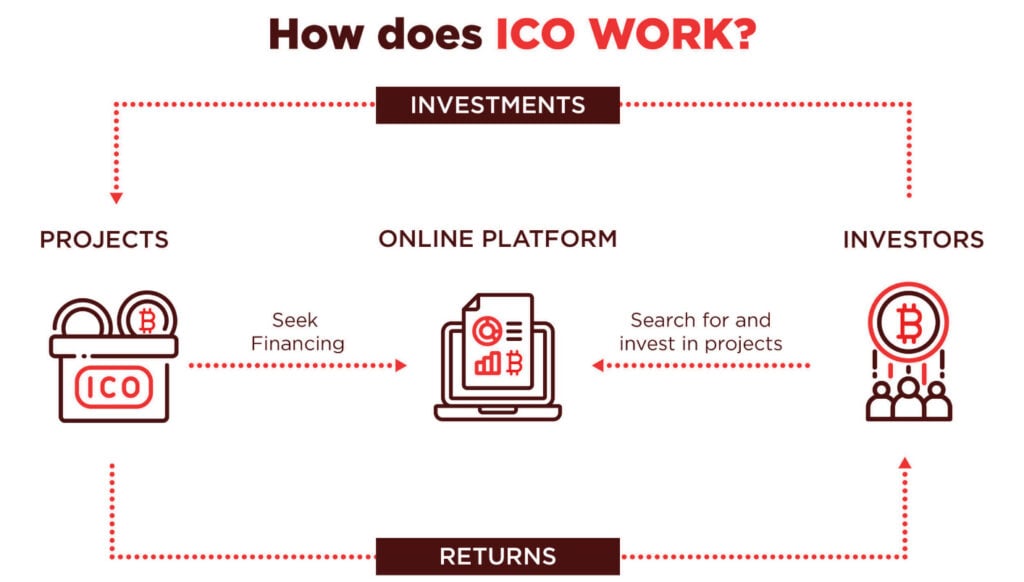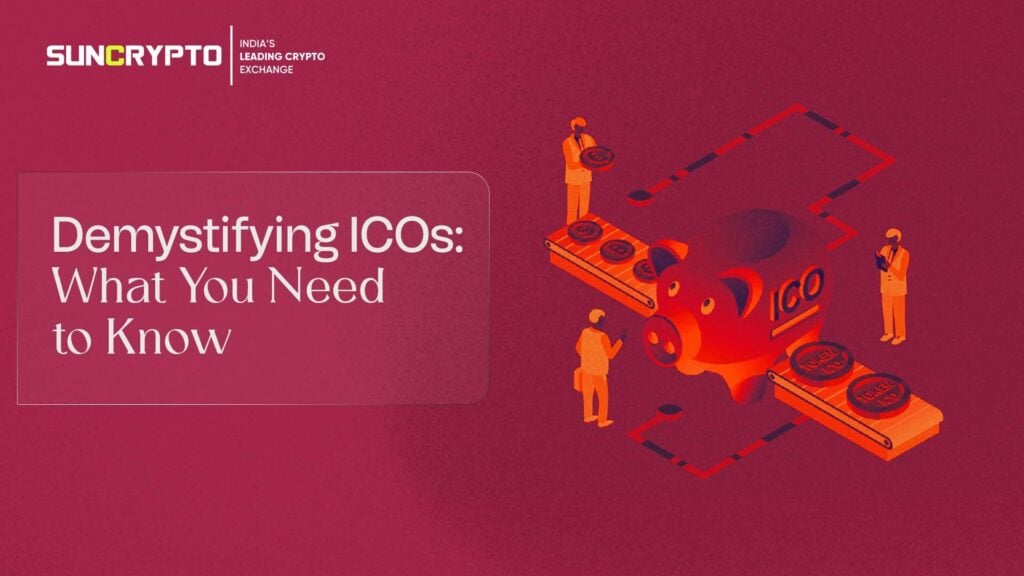Initial Coin Offering (ICOs) are a concept comparable to crowdsourcing. Someone pitches a project concept and advertises it in an attempt to attract investors. If you appreciate their concept, you can purchase the coins or tokens in advance, paying with existing cryptocurrencies or (less typically) traditional currencies.
This helps to support the project and allows the team to refine their concept. If it is successful, the coins’ value rises, and the initial investors profit. So, let’s take a closer look at how ICOs work and what are the risks associated with them.
Initial Coin Offering Explained
An Initial Coin Offering (ICO) serves as a means for teams to gather funds for cryptocurrency projects. During an ICO, teams create tokens based on blockchain technology and offer them to early supporters, effectively initiating a crowdfunding phase. Participants receive tokens that they can utilize either immediately or at a later time, while the project obtains funds for its development.
The concept gained widespread recognition in 2014 when it was employed to finance the development of Ethereum. Subsequently, hundreds of ventures, particularly during the 2017 surge, adopted this method to varying degrees of success. Despite its name’s resemblance to Initial Public Offerings (IPOs), ICOs and IPOs are fundamentally distinct methods of procuring financial support.
IPOs typically pertain to established businesses that sell partial ownership stakes in their company to raise capital. In contrast, ICOs serve as a fundraising mechanism that enables companies to secure funds for their projects in their early stages. When ICO investors purchase tokens, they do not acquire any ownership in the company.
ICOs can present a viable alternative to conventional funding for technology startups, especially when new entrants encounter difficulties in obtaining capital without a fully functional product. In the realm of blockchain, established firms seldom invest in projects solely based on a white paper. Moreover, the absence of cryptocurrency regulation dissuades many from considering investments in blockchain startups.
However, this practice is not exclusive to new startups. Established enterprises sometimes opt for a reverse ICO, a process functionally akin to a regular ICO. In this scenario, a business that already offers a product or service introduces a token to decentralize its ecosystem. Alternatively, they might host an ICO to involve a wider array of investors and raise funds for a new blockchain-based product.
Inner Working of an ICO
Initial Coin Offerings (ICOs) can manifest in various forms. At times, the team behind an ICO will possess a functioning blockchain that they intend to further develop over the coming months and years. In such cases, individuals can acquire tokens that are sent to their blockchain addresses.
Alternatively, when the blockchain has not yet launched, the tokens are issued on an established blockchain like Ethereum. Once the new blockchain is operational, token holders can exchange their tokens for new ones issued on that network.

The most prevalent approach, however, involves issuing tokens on a blockchain capable of smart contracts. Ethereum is a prime example, with many applications adopting the ERC-20 token standard. While not all tokens originate from ICOs, there are currently an estimated 200,000 distinct Ethereum tokens.
Apart from Ethereum, there exist other blockchain options, including Waves, NEO, NEM, and Stellar, among others. Given the flexibility of these protocols, numerous organizations opt to build on existing foundations rather than migrate, benefiting from established ecosystems and tested developer tools.
ICOs are typically announced in advance and establish specific guidelines for their operation. They may outline the duration of the ICO, set a maximum limit for token sales, or incorporate both aspects. Additionally, there could be a whitelist that participants need to join beforehand.
Participants in ICOs then send funds to a designated address, with Bitcoin and Ethereum commonly accepted due to their popularity. Buyers either provide a new address to receive tokens, or tokens are automatically dispatched to the payment sender’s address.
As a result, participating in ICOs offers users tremendous benefits like receiving a substantial amount of free coins and tokens
Who is Eligible for Launching an ICO?
The tools for generating and disseminating tokens are readily available; however, practicality demands a thorough examination of legal aspects before embarking on an ICO.
In the grand scope of the cryptocurrency domain, regulatory frameworks remain noticeably absent, with pressing questions yet unanswered. While some nations outright prohibit ICO launches, even the most crypto-friendly jurisdictions lack definitive legislation. Therefore, it is of paramount importance to familiarize yourself with the laws of your own country before contemplating an ICO.
What Regulations Apply to Initial Coin Offerings?
Providing a universal answer proves challenging due to the multitude of variables at play. Regulations exhibit variations from one jurisdiction to another, and each project possesses unique intricacies that influence how governmental bodies perceive it.

It is essential to emphasize that the absence of regulations in certain regions should not be misconstrued as a carte blanche for conducting crowdfunding via an ICO. Therefore, it is crucial to seek professional legal counsel before opting for this crowdfunding method.
On several occasions, regulatory authorities have penalized teams that raised funds through what they subsequently classified as securities offerings. If a token is deemed a security, the issuer must adhere to stringent measures akin to those applied to traditional assets in this category. In this regard, the U.S. Securities and Exchange Commission (SEC) has offered valuable insights.
Broadly speaking, the evolution of regulatory frameworks in the blockchain space progresses at a sluggish pace, particularly as technology advances outpace the slow-moving gears of the legal system. Nonetheless, numerous governmental bodies have engaged in discussions regarding the establishment of a more transparent framework for blockchain technology and cryptocurrencies.
Although many blockchain enthusiasts harbor concerns about potential government interference that could impede development, the majority acknowledges the necessity of safeguarding investors. Unlike conventional financial sectors, the global accessibility of blockchain poses significant challenges.
Risks Associated with ICOs
The allure of a novel token promising substantial returns is undeniably enticing. However, it’s crucial to recognize that not all cryptocurrencies are cut from the same cloth. As is the case with any cryptocurrency investment, there are no assurances of achieving a positive return on investment (ROI).
Assessing the viability of a project can be a complex endeavor due to the multitude of factors involved. Prospective investors should exercise due diligence and engage in comprehensive research when contemplating investments in specific tokens. This process should encompass a thorough examination of the project’s fundamentals. Below, you’ll find a list of questions to consider, although it is not an exhaustive list:
▪️ Does the concept hold practicality, and what issue does it address?
▪️ What is the distribution plan for the token supply?
▪️ Is the utilization of a blockchain or token essential for the project, or could it be accomplished without one?
▪️ Does the project team possess a credible reputation and the requisite expertise to bring the project to fruition?
Above all, it’s imperative to adhere to the cardinal rule of never investing more than you can afford to lose. The cryptocurrency markets are exceptionally volatile, and there exists a substantial risk that the value of your holdings could experience a sharp decline.
Conclusion
Initial Coin Offerings (ICOs) have proven to be remarkably efficient for fledgling projects seeking financial support during their early phases. After witnessing the triumph of Ethereum’s ICO in 2014, numerous entities secured the necessary funding to advance new protocols and ecosystems.
Nevertheless, investors should exercise caution and remain aware of the nature of their investments. There are no assurances of guaranteed returns in this realm. Given the nascent state of the cryptocurrency landscape, such investments entail substantial risk, with limited safeguards in place in case the project fails to deliver a viable product.
To learn more about an Initial Coin Offering and crypto news, go check out SunCrypto Academy.
Disclaimer: Crypto products and NFTs are unregulated and can be highly risky. There may be no regulatory recourse for any loss from such transactions. All content provided is for informational purposes only, and shall not be relied upon as financial/investment advice. Opinions shared, if any, are only shared for information and education purposes. Although the best efforts have been made to ensure all information is accurate and up to date, occasionally unintended errors or misprints may occur. We recommend you please do your own research or consult an expert before making any investment decision. You may write to us at [email protected].





